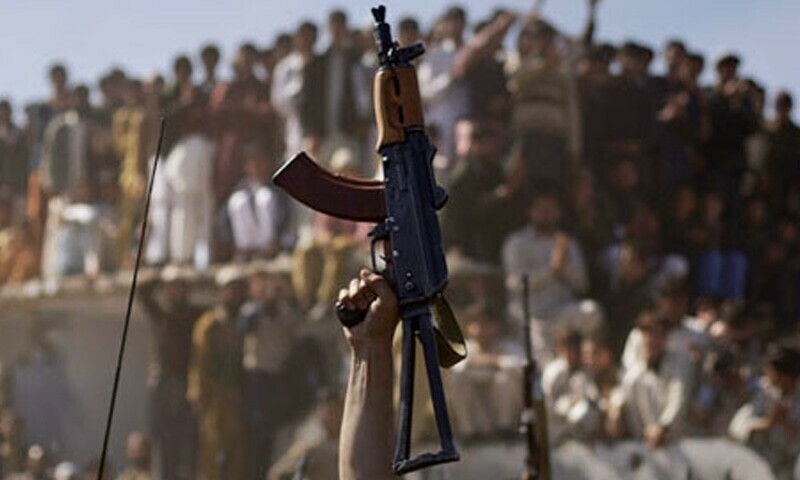In a tragic incident rooted in a long-standing tribal dispute, five individuals were killed and several others injured in a violent gunfight between rival groups in the Tota Adda region of Qila Abdullah, Balochistan. The shootout, which broke out on Sunday afternoon, shook the local community and forced an immediate response from security forces.
This confrontation once again highlights the dangerous volatility of unresolved tribal feuds in the region conflicts often triggered by disputes over land ownership, inheritance, or influence, and exacerbated by the widespread availability of automatic firearms.
Eyewitness Accounts and Immediate Chaos
According to residents, the clash erupted suddenly and escalated quickly, with both parties heavily armed. The sound of automatic gunfire echoed through the area for nearly an hour, forcing families to flee or barricade themselves inside homes. Shops and markets shuttered immediately, and road traffic came to a halt as panic swept across nearby villages.
Locals reported seeing several wounded individuals lying on the roadside before rescue personnel could safely enter. The intensity of the gunfight indicated premeditated aggression and significant preparation by both groups involved.
Law Enforcement and Security Response
Upon receiving distress calls, Frontier Corps (FC) and Levies Force personnel were swiftly deployed to the conflict zone. Armed security teams cordoned off the area to prevent further violence and launched an emergency rescue operation to evacuate the injured.
The wounded were transported to district hospitals, with some later referred to specialized medical centers in Quetta due to the severity of their injuries. The deceased were identified and handed over to their families after completion of medico-legal procedures.
To prevent further clashes, the forces remained stationed in the area overnight, monitoring movement and conducting surveillance of known hotspots linked to tribal rivalries.
Root Cause: An Enduring Land Dispute
Initial investigations point to a long-running feud between the two tribal factions, reportedly fueled by disputes over ancestral land demarcations and claims of illegal encroachments. Such conflicts are not uncommon in Qila Abdullah, where tribal lines often govern land rights, justice, and local authority frequently outside formal legal frameworks.
These tribal rivalries, passed down across generations, can lie dormant for months or years before reigniting with devastating consequences. In this case, tensions had reportedly been simmering for weeks, with several unsuccessful attempts at reconciliation prior to the incident.
Community Intervention and Ceasefire Mediation
Following the intervention by security forces, tribal elders and community leaders from both factions stepped in to facilitate a temporary ceasefire. A series of emergency meetings were held through the night to de-escalate tensions and prevent retaliatory attacks.
While a fragile peace has been established, local residents remain on edge, fearing a possible resurgence of violence if long-term mediation fails. Security personnel continue to monitor the area, and more peacekeeping units have been deployed to maintain law and order.
Government Measures to Prevent Further Violence
Recognizing the gravity of the situation, local authorities have taken several immediate steps:
- Enhanced Levies and FC patrols across Qila Abdullah and surrounding tribal zones
- Launch of a disarmament drive aimed at recovering illegal weapons
- Formation of a tribal conflict resolution committee consisting of neutral elders and district officials
- Monitoring of inter-tribal movement to track potential escalations
- Expansion of community policing programs to improve intelligence and reduce reliance on reactive enforcement
The provincial administration has also reiterated its commitment to strengthening dialogue-based conflict resolution and improving rural legal access to prevent such tragedies in the future.
Broader Implications of Tribal Conflicts in Balochistan
Incidents like the Qila Abdullah gunfight reflect a deeper issue plaguing several parts of Balochistan: unresolved tribal disputes, weak institutional governance, and the easy availability of firearms. These factors combine to create a highly combustible environment where minor disagreements can spiral into bloodshed.
Beyond the immediate human toll, such violence disrupts education, healthcare, commerce, and basic civic life, further marginalizing already underdeveloped regions. The provincial and federal governments face mounting pressure to address these systemic issues with sustained reforms, not just temporary policing.
Conclusion: A Call for Peace and Reform
The tribal clash in Qila Abdullah that left five dead and many injured is a tragic reminder of the fragility of peace in conflict-prone regions. While emergency interventions by security forces helped contain the violence, long-term peace will only be possible through genuine tribal reconciliation, legal empowerment, and strong governance frameworks.
As the families mourn their loved ones and the community begins the slow journey to recovery, the need for proactive, grassroots-based conflict resolution has never been clearer. Without it, the cycle of violence may only pause never end.



Comments (0)
No comments yet. Be the first to comment!
Leave a Comment